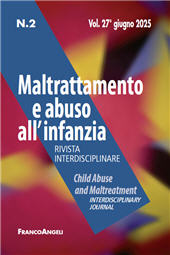Minorenni, criminalità e recidiva, tra giudizi prognostici e istanze di responsabilizzazione
11-34 p.
L'attuale scenario giuridico-penalistico è caratterizzato da una crescente attenzione al fenomeno della criminalità minorile. In questo ambito, il rischio di recidiva e il consolidamento di condotte criminali negli adolescenti e nei giovani adulti sono questioni di particolare rilevanza. Sulla base di varie disposizioni normative, al giudice penale è richiesta una valutazione prognostica sul soggetto agente, al fine di verificare se si asterrà, per il futuro, dal commettere ulteriori reati. Per altro verso, nel codice penale è previsto un aggravamento del trattamento sanzionatorio per il colpevole, se recidivo. Nei casi in cui l'autore di reato sia un minorenne, questi interrogativi si connotano di maggiore complessità, in considerazione dell'evoluzione psico-fisica che lo stesso sta attraversando. Recenti interventi legislativi nell'ambito del sistema penale minorile hanno stabilito che il tipo di reato commesso può costituire un fattore significativo nel determinare il percorso processuale del minore e le
sue possibilità di accesso a misure rieducative. Al di là delle valutazioni giudiziarie strettamente collegate alla tipologia del reato commesso, tuttavia, l'esigenza primaria per il minore è quella di un intervento sulle cause che lo hanno condotto al reato. È essenziale, in particolare, che al minore siano offerte adeguate opportunità di ri-educazione e di responsabilizzazione, al fine di prevenire il consolidamento di comportamenti delinquenziali. [Testo dell'editore]
Currently, the criminal justice scenario is characterised by an increased focus on juvenile delinquency. In this field, the risk of recidivism and consolidation of criminal behaviour among adolescents and young adults are issues of particular concern. In accordance with many rules and regulations, criminal Courts are supposed to provide a prognostic assessment of the offender, in order to determine whether their will desist from further criminal behaviours. In addition, when determining the penalty for a crime, the Italian Penal Code considers habitual and repeated criminal conducts as aggravating factors. Should the perpetrator be a minor, these issues become even more complex, given the psychological and physical development that the adolescent is still undergoing. Recently, some legislative reforms in the juvenile justice system have established that the nature of the offence committed by the minor is a paramount factor in determining their procedural path, including the possibility to access re-education
measures. However, other than the assessments which are strictly linked to the type of offence committed, the first and essential necessity for minors is to see as addressed the underlying causes that led them to the criminal conduct. It is therefore crucial that adequate opportunities are made available to these minors, in order to and with the priority of facilitating re-education processes and preventing the consolidation of a criminal career. [Publisher's Text]
Forma parte de
Maltrattamento e abuso all'infanzia : 27, 2, 2025-
Artículos del mismo número (disponibles individualmente)
-
Información
Código DOI: 10.3280/MAL2025-002002
ISSN: 1972-5140
KEYWORDS
- criminalità minorile, minore autore di reato, recidiva, carriere criminali, misure rieducative
- juvenile delinquency, underage offender, recidivism, criminal career, re-education measures


